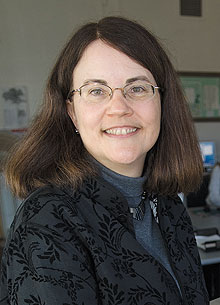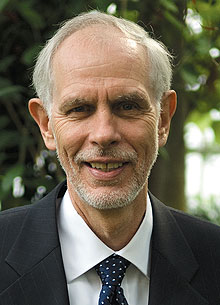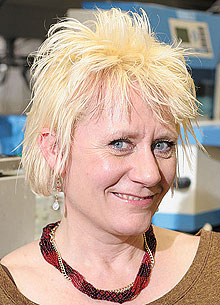  |
| HOME | THIS ISSUE | CALENDAR | GRANTS | BACK ISSUES | < BACK | NEXT > |
Three faculty named Distinguished Professors by Colin Poitras & Cindy Weiss - April 27, 2009 |
||||||
| Two faculty members in the College of Liberal Arts and Sciences and one in the School of Pharmacy have been named Board of Trustees Distinguished Professors. Those receiving the honor in the College of Liberal Arts and Sciences were: Diane Lillo-Martin, a professor of linguistics and former department head; and Gregory Anderson, a professor of ecology and evolutionary biology who stepped down last year as vice provost for research and graduate education and dean of the Graduate School. Anderson is currently serving a one-year appointment as graduate dean in residence at the Council of Graduate Schools and the National Science Foundation in Washington, D.C. In the School of Pharmacy, Diane Burgess, a national expert in drug delivery systems and a professor of pharmaceutics, is now a distinguished professor. The board announced the honors April 21 in recognition of the professors’ “exceptional distinction in scholarship, teaching, and service while at UConn.”
Lillo-Martin studies how children acquire their native language. Her latest research focuses on young children who are learning both spoken and sign language, so-called “bimodal bilinguals.” Some children have two deaf parents who sign, and those youngsters do not have difficulty acquiring spoken as well as sign language, she says. “They are amazing in their ability to go back and forth with languages – they learn so much, so fast,” says Lillo-Martin, who came to UConn in 1986 and serves as editor-in-chief of the journal Language Acquisition. By using American Sign Language with signers and spoken language with speakers, the children learn to appropriately alternate between the two. Children and adults who know both languages also sometimes use them simultaneously; this is known as “code blending.” Lillo-Martin also has a new project studying language acquisition by deaf children with a cochlear implant, a surgically implanted electronic device that provides a sense of sound to those who are deaf or profoundly hard of hearing. Sign language can actually help children learn spoken language, she theorizes; deaf children can learn through sign language while they are being taught the spoken language. Anderson’s research on the origin and evolution of domesticated plants and in conservation biology and biodiversity has taken him around the world. He has field experience in Costa Rica and the Caribbean, Mexico, South America, Australia, Spain, and South Africa. One of the areas Anderson studies – the reproductive biology of island plants – involves a serious conservation problem, he says, particularly on oceanic islands if only one seed is deposited. Effective conservation requires understanding all elements of biology, including conserving plant pollinators so that plants can survive past the current generation. The conservation problem of islands is being extended to land spaces on continents, too, says Anderson, who came to UConn in1973 and was named a Distinguished Alumni Professor in 1997. As native forests and plants diminish – prairie plants in the Midwest, for example – the land is left with “continental islands” where the need for conserving plant and animal species is similar to that on oceanic islands.
Three species of small herbaceous shrubs from Latin America have been named after Anderson, honoring his work on the biology of plants in the potato/tomato/pepper family. In Washington, Anderson has been working to promote international graduate experiences in research and education. Interest is rapidly growing in joint and dual degrees with international connections, he notes. Anderson has been president of the Botanical Society of America and of the American Institute of Biological Sciences, which honored him with a Distinguished Service Award in 2002. At UConn, he served a term as chair of the Senate Executive Committee, and for more than 20 years was a member of the executive committee of the Graduate School’s Graduate Faculty Council. In the School of Pharmacy, Diane Burgess is working with chemistry professor Fotios Papadimitrakopoulos and electrical and computer engineering professor Faquir Jain in developing miniaturized, implantable blood glucose sensors that could become indispensable for millions of people with diabetes. The tiny wireless sensors are small enough to be injected under a person’s skin through a needle. They can be used to relay important, real-time metabolic information such as blood glucose levels without the more invasive skin prick commonly used by diabetics today. More importantly, Burgess says, the biosensors provide continuous readings of the blood glucose and, in doing so, can eventually be used to work in conjunction with an insulin delivery device to act as an artificial pancreas. This will allow tight control of diabetics’ blood glucose levels and prevent the many debilitating side effects of the disease.
Burgess’ research group recently developed a biocompatible coating for the sensors to prevent body tissue from rejecting them or limiting their effectiveness over time. While the coating has been shown to be effective for up to three months, Burgess’ group is in the process of furthering the technology to extend the sensor’s functional lifetime to six months. It is anticipated that the biosensors could be commercialized within just a few years. In addition to her sensor research, Burgess is studying ways that small molecule drugs, vaccines, and gene therapeutics can be safely and effectively delivered at the cellular level. She also is looking into the development of novel technologies for the controlled release of pharmaceuticals. When not in the lab, Burgess spends part of her time as director of the School of Pharmacy’s Study Abroad program. Seven students from the School of Pharmacy and six from other academic disciplines spent five weeks in Beijing, China last summer studying traditional Chinese medicine as part of the program. Burgess is an active member of the American Association of Pharmaceutical Scientists (AAPS), an AAPS fellow, and former president of the association. She is currently president-elect of the Controlled Release Society, an international organization dedicated to the science of delivering bioactive substances. |
| ADVANCE HOME UCONN HOME |



